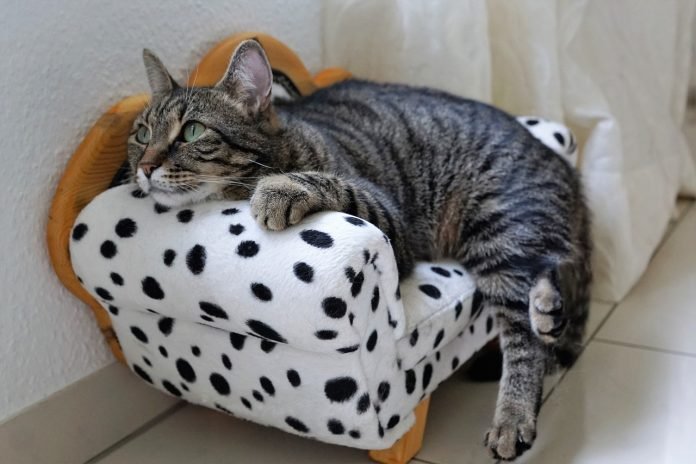As cat owners, we love our furry friends and want to keep them healthy and happy. Unfortunately, one common problem that can afflict our feline companions is tapeworm infestation.
Tapeworms are a type of intestinal parasite that can infest cats and feed off the nutrients in their food. If left untreated, tapeworms can cause discomfort and weight loss and even lead to more serious health problems.
One of the most common types of tapeworms that affect both dogs and cats in the United States is called Dipylidium caninum, which is commonly known as the flea tapeworm. In addition to fleas, tapeworms can also be spread through the ingestion of infected rodents or raw meat.
The good news is there are steps you can take to reduce the risk of tapeworm infestation in your cat. So, let’s dive into some preventative measures.
Regular Deworming: The First Line of Defense
The most important step in preventing tapeworms in your cat is regular deworming. There are a variety of over-the-counter deworming tapeworm medicines for cats available at pet stores and online, and many veterinarians will also prescribe them.
According to PetCareRx, most tapeworm medications for cats are administered orally and work by killing off any tapeworms that may be present in their intestines. Once the medication takes effect, the tapeworms will be expelled from the cat’s body through their feces.
It’s important to follow the instructions on the medication carefully and give it to your cat as directed. The frequency of deworming depends on your cat’s age, lifestyle, and risk of exposure to tapeworms. It’s best to consult with your veterinarian to determine the appropriate deworming schedule for your cat.
Flea Control: A Key Factor in Tapeworm Prevention
Fleas are a common carrier of tapeworms, so controlling flea infestations is essential in preventing tapeworms in cats. Fleas ingest tapeworm eggs, which then develop into tapeworm larvae inside the flea.
When cats ingest fleas during grooming, they may also ingest tapeworm larvae, which can then develop into adult tapeworms inside the cat’s intestines. There are a variety of flea control products available, including topical treatments, collars, and oral medications. Again, it’s best to consult with your veterinarian to determine the most appropriate flea control strategy for your cat.
Avoiding Raw Meat and Hunting
Raw meat, especially pork and beef, can be a source of tapeworms for cats. It’s best to avoid feeding your cat raw meat and to ensure that any meat you do feed them is fully cooked.
Additionally, if your cat is a hunter, it’s important to be aware that rodents and other small animals can also be carriers of tapeworms. It’s best to discourage hunting behaviors and keep your cat indoors to reduce its risk of exposure to tapeworms and other parasites.
Cleaning Your Cat’s Environment: Keep It Clean
Another important preventative measure is keeping your cat’s environment clean. This includes regularly cleaning their litter box, bedding, and any other areas where they spend time.
Tapeworm eggs can be present in your cat’s feces, so it’s important to dispose of them promptly and hygienically. It’s also a good idea to vacuum your carpets and furniture regularly to remove any flea eggs or larvae that may be present.
Regular Vet Check-Ups: Catching Tapeworms Early
Another important preventative measure is to schedule regular check-ups with your veterinarian. During these visits, your vet can check your cat for any signs of tapeworms or other parasites.
They may also recommend additional preventative measures based on your cat’s individual needs. Catching tapeworms early can prevent them from developing into a more serious health issue, so regular check-ups are an important part of maintaining your cat’s health.
Proper Food Handling: Keeping Tapeworms at Bay
Lastly, proper food handling is another important step in preventing tapeworms in cats. This includes washing your hands before and after handling your cat’s food, as well as properly storing any canned or dry food.
Additionally, it’s important to avoid feeding your cat any spoiled or expired food, as these can harbor harmful bacteria and parasites. By following these simple steps, you can help ensure that your cat’s food remains free from tapeworms and other contaminants.
Conclusion: A Happy, Healthy Cat
In conclusion, tapeworms can be a pesky problem for cat owners, but by taking these preventative measures, you can greatly reduce the risk of tapeworm infestation in your feline friend.
Regular deworming, flea control, avoiding raw meat and hunting, and keeping your cat’s environment clean are all important steps you can take to keep your cat happy and healthy.
And it’s always a good idea to consult with your veterinarian to determine the best course of action for your specific cat. With a little effort, you can help ensure your cat remains tapeworm-free and able to enjoy life to the fullest.


















